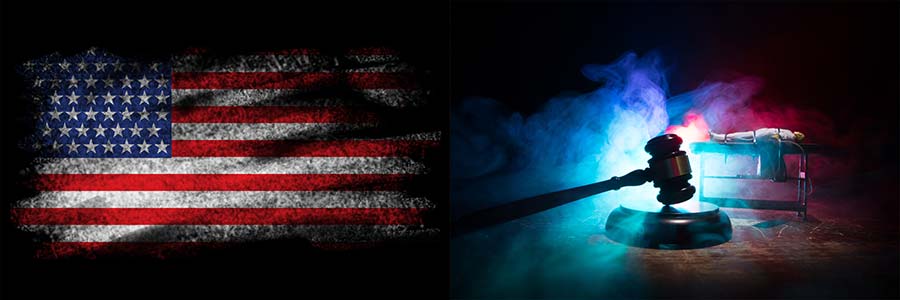The International Bar Association’s Human Rights Institute (IBAHRI) strongly condemns the recent executions of federal death row inmates in the United States of America, including those of Brandon Bernard and Alfred Bourgeois who were executed on 10 and 11 December, respectively.
The IBAHRI opposes the death penalty in all circumstances with its Council Resolution on the Abolition of the Death Penalty calling on all jurisdictions throughout the world to take steps towards eradicating capital punishment.
Further, the IBAHRI is alarmed by the three executions scheduled to take place next month prior to President-elect Joe Biden taking office on 20 January 2021. The planned executions break a precedent, which has stood for more than 100 years, of halting such punishments during the presidential transition.
IBAHRI Co-Chair and former Justice of the High Court of Australia (1996–2006), the Hon Michael Kirby AC CMG, said: ‘The IBAHRI opposes the death penalty in all circumstances and we are deeply concerned by reports of some defendants’ intellectual disabilities, despite the US Supreme Court having ruled in 2002 in Atkins v Virginia, that executing people with intellectual disabilities was unconstitutional. We are also disturbed by claims of racial bias, prosecutorial misconduct and a lack of adequate legal assistance surrounding recent and scheduled federal executions. As the world moves towards abolition, we recall, and concur with, the United Nations Human Rights Committee’s determination that it is contrary to the object and purpose of Article 6 of the International Covenant on Civil and Political Rights for State parties to take steps to increase their de facto rate of use of the death penalty. We call on the US Government to halt all executions.’
Mr Kirby added: ‘The decision of President Trump to proceed with carrying out the death penalty in the closing days of his term of office is particularly distressing and heartless as it deprives the accused of the meaningful exercise of presidential clemency powers that would have followed a delay of a few weeks as the prisoner awaited his fate on “Death Row”.’

Under Article 6(1) of the International Covenant on Civil and Political Rights, ‘no one shall be arbitrarily deprived of his [or her] life’. The UN Human Rights Committee has held that ‘arbitrariness’ should be interpreted broadly to include ‘elements of inappropriateness, injustice, lack of predictability and due process of law … reasonableness, necessity and proportionality’.
In July 2019, US Attorney General William Barr announced that the federal government would reinstate capital punishment. In July 2020, the first federal executions since 2003 took place, breaking a 17-year informal moratorium. To date, ten inmates have been executed by the federal government in 2020, the highest annual figure since 1896.
On 17 November 2020, the Third Committee of the UN General Assembly adopted a resolution calling on all States that still maintain the death penalty to establish a moratorium on executions with a vote of 120-39 in favour. There were 24 abstentions and 10 States that did not take part in the vote.
The same month, the US Department of Justice published an amended rule that will allow federal executions to be conducted in any appropriate federal, state or local facility and by means other than lethal injection, such as poison gas, electrocution and firing squads, if ‘prescribed by the law of the State in which the sentence was imposed or which has been designated by a court…’.
IBAHRI Co-Chair, and immediate past Secretary-General of the Swedish Bar Association, Anne Ramberg Dr jur hc, commented: ‘Capital punishment is a cruel, irreversible and too often arbitrary and discriminatory practice. We urge President-elect Joe Biden to uphold human dignity, revisit the US government’s position on capital punishment and reintroduce a moratorium on the federal death penalty with the ultimate aim of abolition.’
ENDS
Notes to the Editor
-
According to recent research by the Death Penalty Information Center, racial bias persists in US capital punishment cases and ‘defendants of color and foreign nationals who are intellectually disabled are disproportionately likely to be sentenced to death’.
-
Related material:
-
The International Bar Association (IBA), the global voice of the legal profession, is the foremost organisation for international legal practitioners, bar associations and law societies. Established in 1947, shortly after the creation of the United Nations, it was born out of the conviction that an organisation made up of the world's bar associations could contribute to global stability and peace through the administration of justice.
-
The International Bar Association’s Human Rights Institute (IBAHRI), an autonomous and financially independent entity, works to promote, protect and enforce human rights under a just rule of law, and to preserve the independence of the judiciary and the legal profession worldwide.
For further information please contact: